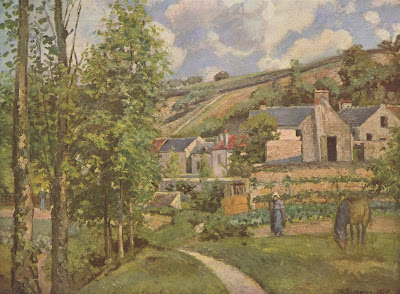
Emmanuel Chabrier [1841-1894] was a French classical composer and pianist. Today he is primarily known as the composer of a short rhapsodic piece entitled España, for full orchestra, or for piano reductions for solo or four hands. España is notable for its sprightly stylistic effects, which have been influential throughout the 20th Century, in "pop" classical compositions (in the music hall), as well as in programmatic music for the theater, the movies, etc. The music of Chabrier's which survives in today's classical repertory suggests the "French Country Folk" culture of the later 19th Century, though Chabrier was, in his time, better known as a composer of operas--a form which preoccupied many composers of his day. I often think that the desire of composers to make successful operas (during this period) is rather like the envy novelists and poets seem to feel for playwrights. How many failed operas and plays have been the result of this misplaced ambition! But perhaps I am not qualified to answer this question. Certainly Henry James, and W. Somerset Maugham--who are both remembered more today for their fictions, than for any success in the theater--were comparative failures as playwrights--at least compared to their fictional efforts. Before radio, amplified sound, television, etc., live theater and opera provided one of the few ways of imaginative transport for the general public. A playwright or composer who could command the approbation of large urban audiences with live performances probably craved this kind of confirmation far above a silent reading public. In the 20th Century, Hollywood lured many writers, in the same way, with its easy money and veneer of glamor and celebrity milieu. It seems odd, thinking about the twists and turns of art and commerce, that a serious French opera composer of the late 19th Century would write the kind of music which would one day be used to animate movies, another popular art medium.
Chabrier was admired by many Modernist composers, whose work he influenced, including Satie, Debussy, Ravel, Stravinsky, Falla, Granados, Prokofiev, Les Six (Poulenc, Milhaud, Honegger, Auric etc.). His work is "picturesque" and highly melodic, energetic and declamatory. His collection of piano pieces--Piéces Pittoresques--particularly the sprightly Scherzo-Valtz, and the Idylle, are still regularly performed. I've always like the Danse Villageoise, and Mauresque, too, from this set.
Chabrier is not nearly enough appreciated these days, despite his varied catalogue of genres. Before the advent of atonalism, and the many rationalist/synthetic forms of composition which were explored in the 20th Century, music was composed primarily to appeal through its seductive emotional aspect, so that in our jaded eyes, "romantic" music sounds gratefully free of the angst and despair of much of Modernist and Post-Modernist composition, though it also suffers a consequent neglect for being thought simple-minded or naive. The notion that a serious piece of music might reflect a sense of "difficulty" in its apprehension, or that it should wear its confusion or alienation on its sleeve--are similarly very Modernist ideas indeed. "Challenging" audiences with musical repugnance would not have occurred to a composer like Chabrier, which may excuse to some degree the character of his work. We think of work like this as being "merely" decorative or entertaining, as if the condescension that verdict implies, made our age superior to his. But of course that only reveals our own prejudicial regard. We expect a powerful emotional range from the composers we consider great. Bach, Beethoven, Brahms, Richard Strauss, Puccini, Stravinsky. A figure such as Saint-Saens--another 19th Century French composer [1835-1921] certainly fills out the picture of a serious classicist, dedicated to the dominant European traditions of big works with big ideas. But his work looks to the past, while the work of Chabrier, Debussy and Stravinsky is about the future.

Pissaro
This progressive view of the history of the development of artistic form(s) ignores works which don't fit into a proper historical order. I've observed that the work of the contemporary American poet Anthony Hecht [1923-2004], particularly his later rhymed works, probably belong more to the 18th Century than to the later 20th. If this constitutes some sort of dismissive indictment, then so be it. We're free to appreciate nearly any kind of art or entertainment we like (at least in the West), without having to invest in its political or aesthetic entitlement; and the reasons for our liking it are nobody's business. Chabrier was also associated with some of the leading writers and painters of his time, such as Monet, and Manet; and he collected Impressionist canvases before this became fashionable.

Other works of charm and effusive spirit are his Habanera, Bourrée Fantastique, Feuillet d'album, and the Fete polonaise and Nocturne (from Act II, and Act III, respectively, of his opera Le Roi malgré lui [The King in Spite of Himself]). As I've mentioned before, I'm not much of a pianist, but I loved once to play the Piéces Pittoreques. They're challenging even for the best of players, but they're so much fun you can't ignore them. It's hard to imagine anyone wanting to suffer through a piano work by Anton Webern, but cheerful compositions naturally draw you in.

Cezanne

3 comments:
So how come when I hear Habanera I always think of this?
http://www.youtube.com/watch?v=qMtyhn3ieJQ
That association is okay. But as your musical horizons EXPAND!! hopefully you'll have more echoes in your databank to fall back on.
The singer was one of my university students in a literature course where we read King Lear and The Tempest along with The Dubliners. The course was supposed to include The Wasteland and Brideshead Revisited, but the original instructor had a drinking problem. He'd have blackouts and revive thinking he was Dylan Thomas. The Tongans sent him back to Ireland for his own safety. I had the dubious honor of salvaging what I could of the curriculum he'd set.
Post a Comment